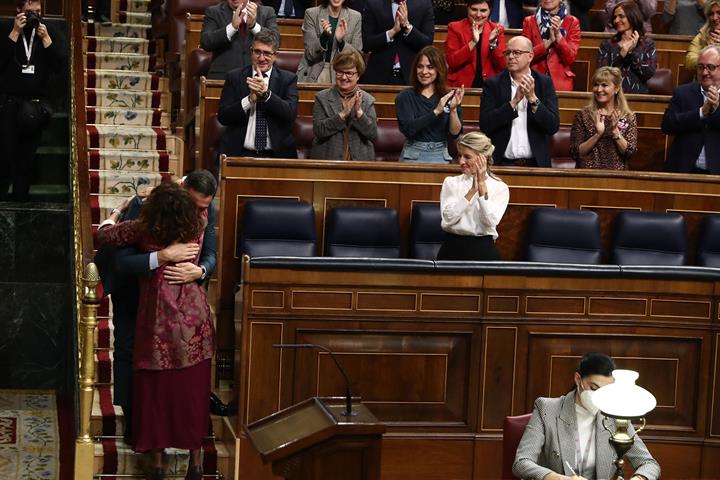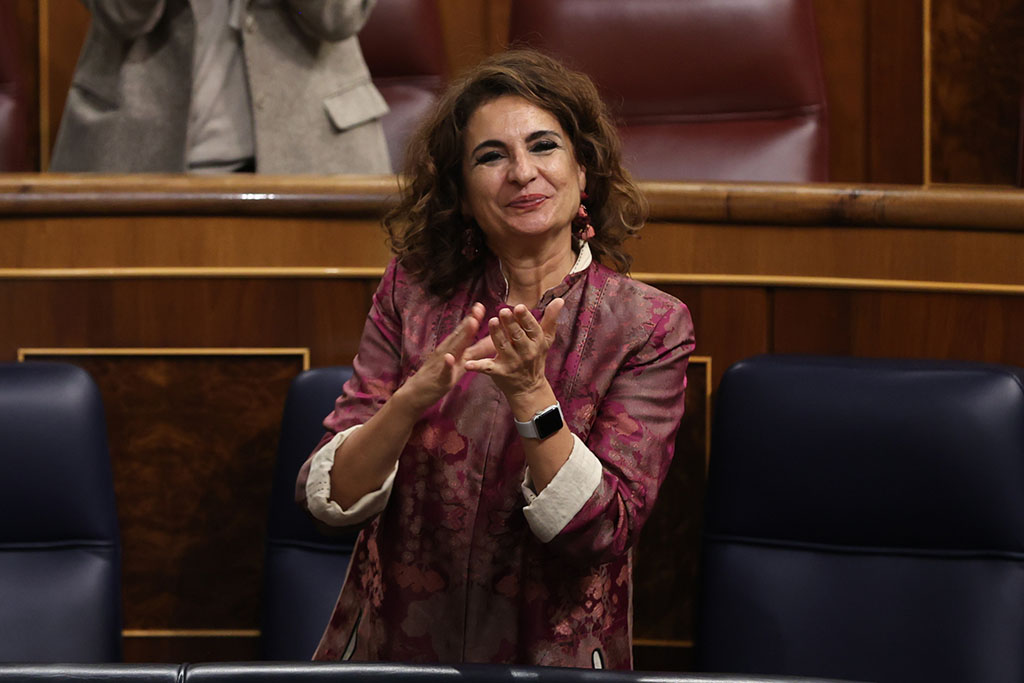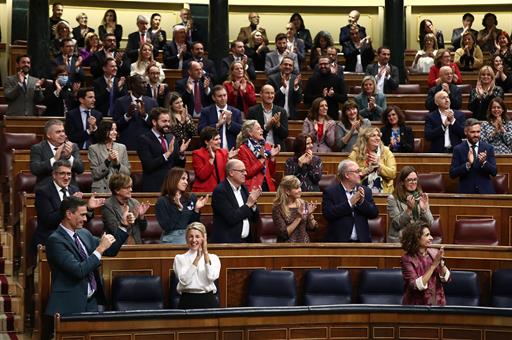The Lower House approves the General State Budget for 2023 by a comfortable majority
News - 2022.11.24
The draft General State Budget Bill for 2023 was approved today in the Lower House of Parliament by a comfortable majority, which highlights the Government's capacity for dialogue and the high level of parliamentary support for its economic and social policy represented by public accounts drawn up for the social majority of the country.
Specifically, the General State Budget for 2023 presented by the Ministry of the Treasury and Public Function received the backing of ten political groups (PSOE, Unidas Podemos, ERC, PNV, Bildu, PDeCAT, Más País, Coalición Canaria, Compromís and PRC) and will now continue its passage through the Upper House of Parliament.
The aim is for the public accounts to be approved in due time and form and, therefore, to enter into force on 1 January for the third consecutive year, something that has not happened since the middle of the last decade.
In this regard, the Minister for Treasury and Public Function, María Jesús Montero, stressed that the approval of the Budget gives "stability" and "confidence" to Spain and sends a "very positive" message to attract investment to the country, as has already occurred in recent weeks, as well as benefiting the middle and working classes, SMEs and self-employed people.
The approval of the accounts in the Lower House of Parliament comes a few days after the European Commission backed the Government's Budget Plan, highlighting its prudent nature and considering that the growth, deficit and debt forecasts are in line with those expressed by the EU authorities.
 The President of the Government of Spain, Pedro Sánchez, and the Minister Minister for Treasury and Public Function, María Jesús Montero, celebrate with a hug the approval of the General State Budget Bill for 2023 | Pool Moncloa/Fernando Calvo
The President of the Government of Spain, Pedro Sánchez, and the Minister Minister for Treasury and Public Function, María Jesús Montero, celebrate with a hug the approval of the General State Budget Bill for 2023 | Pool Moncloa/Fernando Calvo
Pension revaluation and more resources for young people
The 2023 budget is designed to strengthen the welfare state and boost economic efficiency. Thus, the public accounts include record social spending with 266.719 billion euros, excluding European funds. The figure rises to 274.445 billion with EU resources.
In fact, the Budget includes the highest spending in history on scholarships, health, dependency and pensions. In this sense, the accounts guarantee the purchasing power of pensioners by including a revaluation in line with CPI, which will mean an increase of around 8.5%. One that is compatible with the sustainability of the system is that for the first time in 13 years the so-called 'pension piggy bank' will be increased with a state contribution to the Reserve Fund of 2.957 billion euros from the Intergenerational Equity Mechanism.
Support for pensioners is compatible with increasing resources for young people, whose policies increase by 13.2% to 12.741 billion euros. Among the specific measures for this group in 2023 is the extension of the 250 euros for the youth rental voucher and the extension of the 400 euros for the youth cultural voucher so that those who turn 18 next year will have greater access to the cultural industry.
To fulfil the Government's commitment to quality public services, it is necessary to dignify public employment. This is why this Budget also includes a wage revaluation for public sector workers of 2.5% in 2023, an increase that could rise by up to one additional point depending on the fulfilment of various variables linked to inflation and the increase in nominal GDP. It should be noted that this revaluation is based on the consolidated remuneration for 2022, which includes an additional increase of 1.5% on top of the 2% rise already approved in the previous public accounts.
Measures to mitigate the impact of price rises
 The Minister for Treasury and Public Function, María Jesús Montero, applauds after the approval of the General State Budget Bill for 2023 | Agencia EFE
The Minister for Treasury and Public Function, María Jesús Montero, applauds after the approval of the General State Budget Bill for 2023 | Agencia EFE
The Budget also incorporates measures to mitigate the impact of the crisis on the most vulnerable sectors resulting from the Russian invasion of Ukraine. In this sense, the Minimum Basic Income will also be revalued by around 8.5%, which will benefit 1.2 million people.
For its part, the IPREM, the reference index used for granting many subsidies, increases by 3.6% and will stand at 600 euros. Another measure to mitigate the rise in energy prices is the increase of 102 million euros in the thermal social voucher.
In addition, to further the Government's policy of protecting the most vulnerable groups, this Budget also includes strengthens unemployment benefits by increasing it from 50% to 60% of the regulatory base from six months onwards. This will mean that some 300,000 unemployed people in this situation will be able to receive an average of 100 euros more per month.
To mitigate the price increases resulting from the war, these public accounts also include initiatives that benefit middle and working classes, such as free public transport on Cercanías, Rodalies and Media Distancia.
Furthermore, the public accounts show the government's commitment to equality and reconciliation policies. In fact, 201 million euros is earmarked for the Corresponsables Plan, of which 190 million euros will be transferred to the Regional Governments. The budget for combating sex-based violence is also increased by 51 million euros.
More investment to transform the production model
One of the pillars on which this Budget is based is to move towards a new production model focused on efficiency, research and territorial cohesion. To this end, the public accounts have a real investment of 11.867 billion euros, an increase of 33%.
A large part of this drive is due to the investments in the Recovery Plan, which total 25.156 billion euros between the annual instalments of the Recovery Mechanism, the REACT-EU and the addendum, once the final amounts allocated by the EU for the European funds are known.
To achieve this transformation, it is essential to promote R&D policies, which increase 22.8% to 16.328 billion euros.
Finally, the 2023 Budget also maintains the commitment to the financing of local and regional governments. Specifically, the Regional Governments will receive 135.274 billion euros in payments on account and for the 2021 settlement. This is an unprecedented figure and represents an increase in funding of 24% over this year.
In the case of the municipalities, the payments on account and positive settlement in 2021 will amount to 23.235 billion euros, 5% more than in the previous year.
Non official translation
More Info
- General State Budgets Bill 2023
- The General State Budget for 2023 passes its first reading in Congress by a large majority (2022/10/27)
- The Government of Spain presents the 2023 Budget to Congress, which benefits the social majority and boosts economic efficiency (2022/10/06)
- The Government of Spain approves the draft General Budget for 2023 (2022/10/04)





